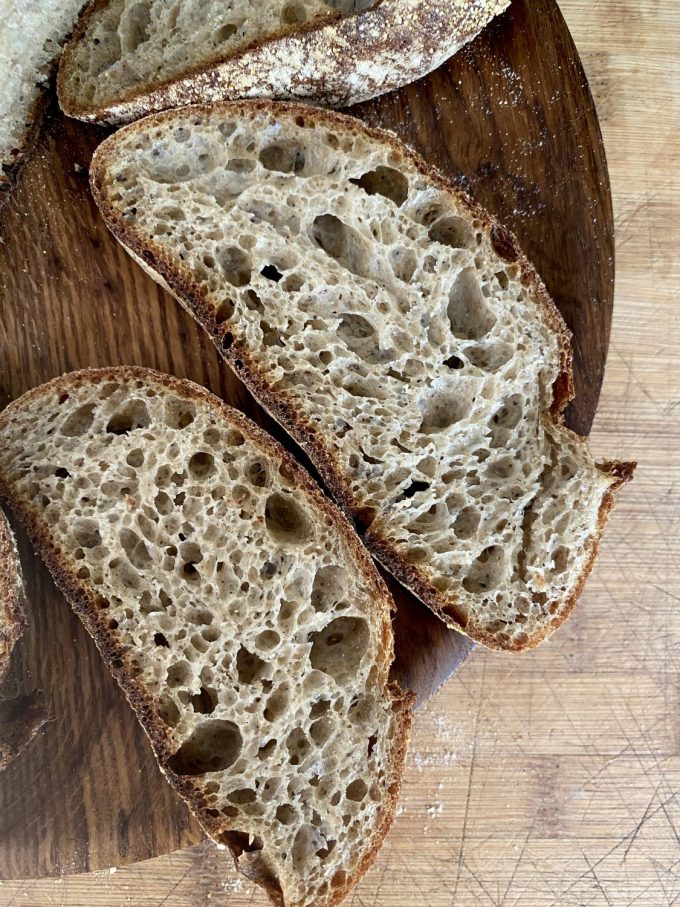
Is sourdough bread good for you?
The sourdough workshops held here at the Sourdough School are about personalising bread, I use genetic testing and gut microbiome assessments to tailor health bread to the individual to make the healthiest bread in the world.
I am often asked if sourdough is really healthy. Often people pause and wait, although the are expecting me to confess that it’s all nonsense and it doesn’t matter what kind of bread you eat. But asking if sourdough is really the healthiest bread in the world a genuine question so I will explain everything you need to know to better understand if sourdough is good for you.
There is no simple answer to the question sourdough bread good for you?
The simple answer is that there is no simple answer. First, it depends on the kind of sourdough bread you are talking about. If I am being honest, there are times when I have looked at a commercial “sourdough” option and left the shop with a wholegrain yeasted organic instead. Why? Because fermentation is not enough. You could, in theory, ferment cardboard. Fermented cardboard is not nutritious, and although I am being facetious, my point is this: if there is no nutrition in your flour, how can fermenting it improve its nutritional value? To a certain degree, the fermentation creates more resistant starch, but that’s about it. If I share a couple of examples of “experts” sharing misleading posts about bread, this should help explain things.
Even some sourdough made with a starter is not necessarily better for you.
To illustrate this point, here is Preppy Kitchen making sourdough. His enthusiasm is lovely, compensating somewhat for the inevitable constipation you will have from the total lack of fibre in the recipe. Sorry, Preppy, I would argue that despite your bread being homemade, the main ingredient is white roller-milled flour that is so refined in structure that it should be considered ultra-processed. Here is a more informative factual feature on ultra-processed bread. Although there are many articles asking if Sourdough Bread is good for you, there is also a huge level of misinformation. This is another example of misinformation. ” The lactic acid in sourdough bread helps your body to absorb more of the nutrients from sourdough bread than you would from regular white wheat bread.” is actually pretty contentious. Perhaps there is an argument that the lactic acid would break down the gluten, but often, these statements miss the fact that the breakdown is prominently enzymic.
Most of the sourdough bread I see on supermarket shelves is still a sham.

Some dieticians will also tell you that sourdough is better for you. Here is yet another example of a writer saying that sourdough bread is better for you. It is a good feature, but I would also suggest that the bread in the main photo has minimal levels of fibre. By neglecting to discuss the quality of the ingredients that are being fermented, articles such as these are likely to mislead readers about the health benefits of fermentation. The more misinformation and half-truths circulate, the more commercial manufacturers can get away with passing off improperly fermented sourdough as health-giving bread. Despite new self-regulated labelling guidelines, some of the bread we see on supermarket shelves today is a sham.
I find this kind of poor quality sourdough insulting to my tastebuds.
Poor quality sourdough offends my palate, with a bad crumb structure and dreadful taste. These loaves do not bounce… they crumble.
I remember a moment at The World Bread Awards when the former Editor of Delicious magazine, Karen Barnes, and I both, somewhat reluctantly, popped a piece of bread cut from one of the loaves into our mouths to taste It was like the supermarket breads I have looked at recently. It was flat, dense, vinegary smelling and crumbly. I knew I should have trusted my instincts, but I decided to eat a piece in the spirit of being a fair judge. It wasn’t good; and Karen couldn’t bring herself to swallow the sample, elegantly dropping it into a tissue to dispose of it. I, on the other hand, gagged and hurled myself to the nearest bin and spat it out. My acute sense of taste is usually an asset, but as I looked up, feeling a little embarrassed that my gag reflex had been triggered, I realized that everyone was looking at me, and I instinctively knew something was wrong. What I thought was a bin was another judge’s large, trendy black shopping bag. I did pick out the sample. I remember being acutely embarrassed while laughing uncontrollably. It’s a nervous reaction, but perhaps one of the reasons the aforementioned handbag owner promptly unfollowed me on social media despite my apologies.
So the moral of this tale is that if a “sourdough” looks revolting, it probably is revolting, and I doubt it will be good for you. You can expect refined white flour being touted as healthy in many “sourdough” supermarket breads. If this is the case, then the carbohydrates will raise your blood sugar and deny your gut fibre, having a similar affect on your body as refined commercially yeasted white bread – but for a lot more money.
What to look out for if you are buying Real Sourdough
Look for bread that has about 6% fibre per 100g and look for a crumb structure that has been genuinely transformed by the action of lactic acid bacteria or wild yeast, which is traditionally understood to be what sourdough is. The photo at the top of this article is a useful reference. Look for signs of irregular patterns in the crumb structure and a slight stickiness from the fermentation in your bread. The bacteria change the structure of the dough and the taste. There are, in fact, many reasons that genuine sourdough is good for you, especially when made with really good quality whole-grain flour.
What Are The Comparative Benefits of Sourdough Bread over Yeasted Bread
The four main areas that make sourdough different are
- Digestibility and Nutrient Bioavailability: The fermentation process and reduction of phytic acid inherent to sourdough preparation often reduces certain antinutrients. As a result, sourdough bread tends to be more nutritious, making it a favourable option for individuals with gastrointestinal concerns, such as Irritable Bowel Syndrome (IBS). The lower levels of these antinutrients can enhance the digestibility of sourdough, potentially alleviating some digestive issues.
- Absence of Harmful Additives: Home-baked sourdough typically omits various commercial additives, some of which have been scrutinised for their deleterious health effects. Recent research suggests that certain emulsifiers might adversely affect gut flora, reducing the prevalence of beneficial microbes responsible for producing micronutrients vital for gut barrier integrity.
- Fibre Content and Cancer Risk: Incorporating increased fibre levels in sourdough preparations can reduce the risk of specific cancer types.
- Glycaemic Response Modulation: The structural alterations resulting from fermentation influence sourdough’s digestibility rate. As such, sourdough bread may offer a more moderated glycaemic response, helping to balance blood sugar levels.
To understand if sourdough is good for you, you need to understand that the process is a biochemical and structural shift that transpires during sourdough fermentation. If you correctly ferment, then you can present a persuasive argument for its potential superiority over yeasted bread from a health and nutritional point of view. Remember the earlier point: You can theoretically ferment cardboard, but for genuinely nourishing bread, your starting point is nourishing flour.





Leave a Reply